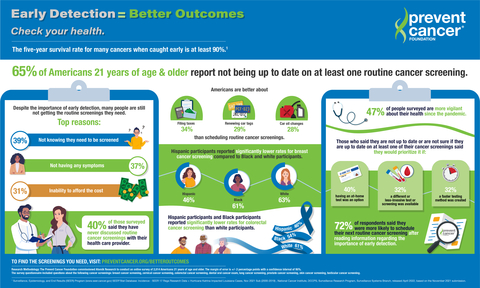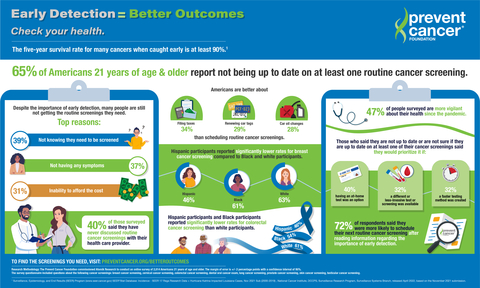ALEXANDRIA, Va.--(BUSINESS WIRE)--In the Prevent Cancer Foundation’s first annual Early Detection Survey, 65% of Americans 21 years of age and older say they are not up to date with one or more routine cancer screenings.1 According to the data, most Americans are better about filing their taxes, renewing their car tags and getting their car’s oil changed than scheduling a routine cancer screening.
These findings, released today during National Cancer Prevention Month, emphasize the need for increased awareness and access to recommended screenings for prevention and early detection. Early detection of cancer can mean less extensive treatment, more treatment options and better chances of survival, leading to better outcomes.
Despite the importance of early detection, many people are still not getting the routine screenings they need. Survey participants cite not knowing they need to be screened (39%), not having symptoms (37%) and inability to afford the cost (31%) as top reasons for not being up to date. Additionally, 40% of respondents said they have never discussed routine cancer screenings with their health care provider.
To educate Americans on the routine cancer screenings they need and encourage them to schedule appointments, the Prevent Cancer Foundation is launching a new signature campaign—Early Detection = Better Outcomes.
“When people learn the benefits of early detection, they are much more likely to talk to their doctors and get screened to check their health,” said Jody Hoyos, CEO of the Prevent Cancer Foundation. “Routine screenings should be part of your wellness routine, just like eating healthy, exercising and taking care of your mental health.”
The Early Detection = Better Outcomes campaign shares helpful information, such as screenings you need at every age, tools to find free and low-cost cancer screenings and information on how your family health history can impact your cancer risk. A new interactive tool delivers a personalized screening plan that you can take with you to the doctor’s office.
The survey highlights the need for culturally relevant resources tailored for Hispanic and Black communities. Hispanic participants reported significantly lower rates for breast cancer screening (46%) compared to Black participants (61%) and white participants (63%). For colorectal cancer screening, Hispanic participants (46%) and Black participants (54%) reported significantly lower rates than white participants (61%).
Additional findings reveal that nearly half of the people surveyed are more vigilant about their health since the pandemic. Yet, a third (33%) of Americans surveyed say that potential exposure to COVID-19 continues to have a negative impact on whether they go to their routine medical appointments.
Results also show a need for continued innovation with less invasive tests and more at-home test options. Among those who said they are not up to date or are not sure if they are up to date on at least one of their cancer screenings, 40% said having an at-home test option would make them likely to prioritize one or more of their routine cancer screenings.
About the Prevent Cancer Foundation®
The Prevent Cancer Foundation® is the only U.S.-based nonprofit organization solely dedicated to cancer prevention and early detection. Through research, education, outreach and advocacy, we have helped countless people avoid a cancer diagnosis or detect their cancer early enough to be successfully treated. We are driven by a vision of a world where cancer is preventable, detectable and beatable for all.
The Foundation is rising to meet the challenge of reducing cancer deaths by 40% by 2035. To achieve this, we are committed to investing $20 million for innovative technologies to detect cancer early and advance multi-cancer screening, $10 million to expand cancer screening and vaccination access to medically underserved communities, and $10 million to educate the public about screening and vaccination options. For more information, please visit www.preventcancer.org.
1 The cancer screenings studied in this survey were for breast cancer, cervical cancer, colorectal cancer, oral cancer, lung cancer, prostate cancer, skin cancer and testicular cancer.




